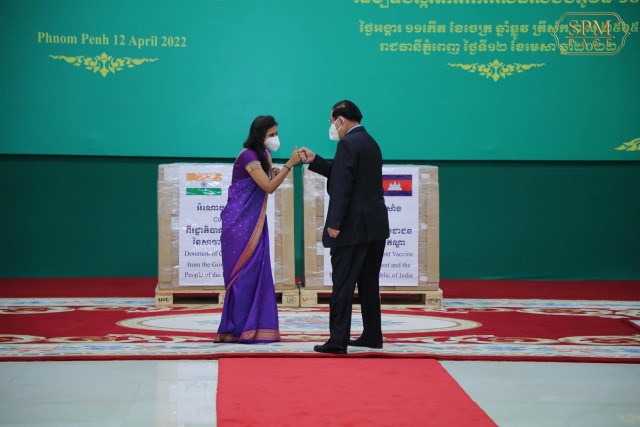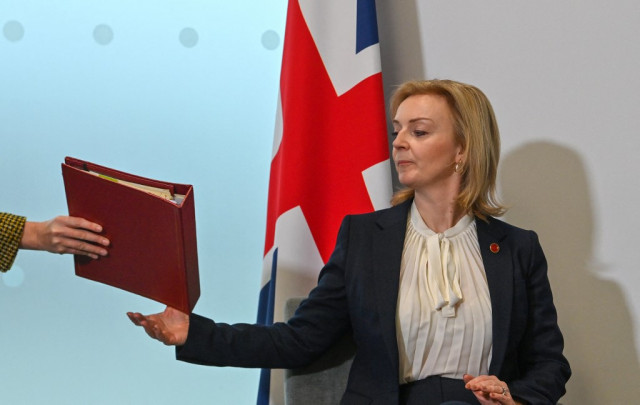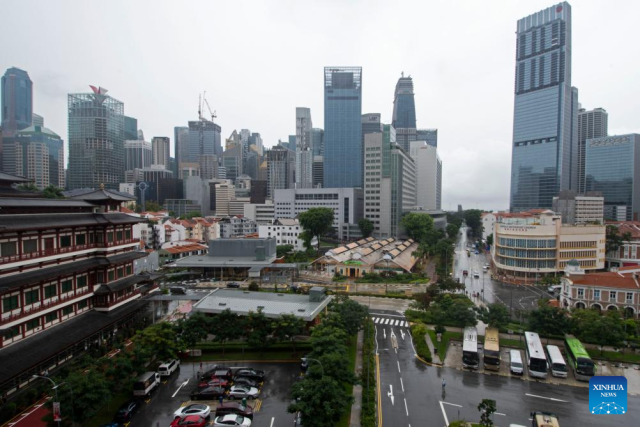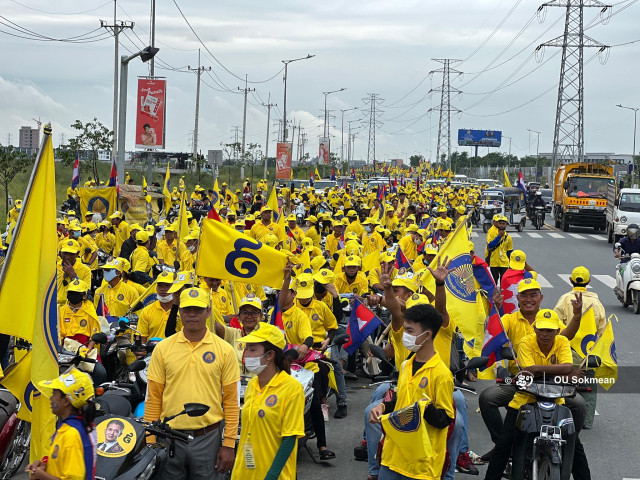Cambodia Rceives 200,000 Doses of COVID-19 Vaccines from India

- By Teng Yalirozy
- April 12, 2022 2:17 PM
Another batch containing 125,000 doses is expected to arrive on April 14
PHNOM PENH – Cambodia, on April 11, received 200,000 doses of COVID-19 Covishield vaccines from the Republic of India under the Quad Initiative, a strategic security dialogue between Australia, Japan, the United States and India.
The handover ceremony was held at the Peace Palace under the presence of Hun Sen, Prime Minister of Cambodia, and Devyani Khobragade, ambassador of India to Cambodia.
Two hundred thousand doses of Covishield vaccines arrived in Cambodia on April 11, and an additional batch containing 125,000 doses is expected to arrive on April 14, according to York Sambath, a secretary of state at the Ministry of Health.
“On behalf of the people and the Royal Government of Cambodia, I would like to express my gratitude to the Republic of India, a compassionate friend of Cambodia,” said Prime Minister Hun Sen during the handover ceremony.
He went on to say that India has made a crucial contribution to Cambodia’s socio-economic recovery through humanitarian assistance, trade, culture, and financial lending since 1981 after the end of the Khmer Rouge Regime. Though the Cambodia-India relationship slightly decline during the COVID-19 pandemic, India remains one of Cambodia’s main strategic partners, Hun Sen said.
The Indian Ambassador to Cambodia Devyani Khobragade, said that the donation of 325,000 doses of COVID-19 Covishield vaccines under the Quad partnership is a symbolic gift from India to Cambodia to cooperate in the fight against the global disease.
She added that Hun Sen has been the guiding factor of the Ministry of Health to control the COVID-19 outbreak in Cambodia with a persistent effort. The good management of the pandemic allowed economic activities in Cambodia to regain their precedent full swing and to let people gather without restrictions and numbers.
“The Royal Government of Cambodia truly deserves the praise for inoculating unprecedented levels of its population at the breakneck speed,” said Khobragade.
As of April 11, Cambodia has inoculated at least two doses of vaccine to 14.8 million people, equivalent to 92.79 percent of the 16 million population.
“In fact, with a proactive spirit and diligent efforts to find vaccines and launch a national [vaccination] campaign in February 2021, Cambodia could achieve full herd immunity in just about eight months,” Hun Sen said.
So far, Cambodia has received more than 73 million doses of COVID-19 vaccines through its several partnerships and through the COVAX Facility, an initiative led by the World Health Organization which goal is to give equitable access to vaccines to 190 countries, said York Sambath, secretary of state at the Ministry of Health.
11 million doses in stock, 22.5 million already scheduled
Through COVAX, more than 7.5 million doses of vaccines will be reserved until Sept. 2022, while another 15 million doses of Chinese vaccines are scheduled for later this year, said Sambath.
At the moment, Cambodia has more than 11 million doses of COVID-19 vaccines in stock. Eight million doses are stored in the warehouse of the Ministry of Health while nearly three million doses are being delivered to people across Cambodia, Sambath said.
Hun Sen said this high vaccination rate is the main reason that allowed Cambodia to reopen the country in all sectors on Nov. 1, 2021, and to live with a new normal in a resilient and safe manner, despite the spread of the Omicron variant.
“The prolonged spread is a risk for all of us, probably leading to a recurrence of the outbreak and a potential socio-economic crisis,” he said. “In this spirit, Cambodia would like to encourage the promotion and acceleration of vaccination to build the herd immunity, which is the most appropriate and effective response measure.”
Indian Ambassador Devyani Khobragade said that the Quad countries, namely Australia, Japan, the USA and India, have pledged to donate more than 1.3 billion COVID-19 vaccines globally, in addition to the doses that each country has contributed to on its own, to WHO, UNICEF, COVAX Facility and other organizations.
She added that Australia, Japan, and the USA have provided approximately 4.6 million doses of COVID-19 vaccines to Cambodia, while an additional two million doses are expected to arrive in Cambodia by the end of April. India has donated 170 million doses of vaccines to 96 countries and two units of the United Nation, Khobragade said.
“Cambodia would like to express its gratitude and appreciation to the members of the Quad Initiative, as well as the other countries around the world, for their efforts in the fight against COVID-19 in respective countries, regions, and the whole world to ensure the rapid recovery of socio-economic activities,” said Prime Minister Hun Sen.
Hun Sen encouraged the further strengthening of friendship, cooperation, and bilateral relations between Cambodia and the members of the Quad initiative. He insisted on a reinforcement of the ties between Cambodia and India in terms of trade, investments, the development of information technology and tourism, a relaxation of travel requirements and a better connection through direct flights.
“Finally, I would like to remind Cambodian people to continue to strictly implement health measures, especially on the occasion of the Khmer New Year,” he said.
On April 10, Prime Minister Hun Sen decided to lift mandatory mask-wearing in four provinces, with immediate application. The selected provinces are Ratanakiri, Mondulkiri, Stung Treng, and Preah Vihear, which are the provinces with the lowest level of contamination to COVID-19.
York Sambath, secretary of state at the Ministry of Health, said that the mask-free application in four provinces is an experiment and that the mask-free mechanism will be evaluated after Khmer New Year. The experiment will be conducted in other provinces as well, she added.















